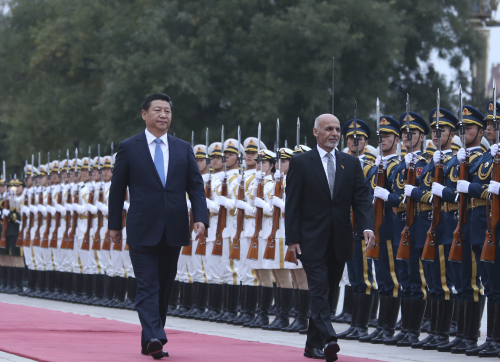 |
|
WELCOME NEIGHBOR: Chinese President Xi Jinping (left) and his visiting Afghan counterpart Ashraf Ghani Ahmadzai inspect the guard of honor during a welcoming ceremony before their talks in Beijing on October 28 (DING LIN) |
One month after assuming office, Afghan President Ashraf Ghani Ahmadzai chose China as the destination of his first official foreign visit. Though it came as a surprise to some in the Western media, Chinese observers and some Afghan political analysts claimed that Ahmadzai's latest move to deepen bilateral relations with China is understandable.
The U.S.-led NATO combat mission in Afghanistan, which began in 2001 with the ousting of the Taliban regime that sheltered Al Qaeda leaders, is scheduled to come to an end this December. While a bilateral security agreement signed between Afghanistan and the United States on September 30 allows a limited number of troops to remain in Afghanistan after NATO-led troops' pullout, the war-torn Central Asian country is quietly preparing for a post-NATO situation.
Despite the decade-long military involvement of the NATO coalition, Afghanistan has not seen adequate improvement, as terrorist activities by extremist groups like Taliban are still rampant. Following the withdrawal of NATO forces, the future security situation in Afghanistan has been plunged into greater uncertainty.
Worse yet, Afghanistan's economy is still far from self-sufficiency. Even the government finance of the country is highly reliant on foreign assistance. A World Bank report estimated that more than 60 percent of government spending of Afghanistan comes from international aid.
Media reports showed that due to a sharp decline of fiscal revenue, the Afghan Government suspended the payment of its employees in October. The country is facing a new round of economic recession and unemployment is more prominent, further affecting social stability while increasing the possibility of the unemployed youth turning to the Taliban.
"Under the current situation, it is vital for the Afghan Government to seek support from other countries for its own stability and development. As Afghanistan's largest neighbor and the world's second largest economy, China inevitably becomes the first choice," said Fu Xiaoqiang, a senior researcher on Afghan studies with the China Institutes of Contemporary International Relations (CICIR).
Some Afghan observers agree with Fu, noting that as an economic powerhouse and a good neighbor of Afghanistan, China can play a vital role in stabilizing the conflict-ridden country through investment in economic projects there.
In an interview with Xinhua News Agency, Ebraheem Darwishian, a professor at Kabul University, opined that the main reason for continued instability in Afghanistan is the high rate of unemployment and poverty, adding that China can create job opportunities and contribute to stability by investing in the country.
"Since the conflicts and insecurity halt investment in Afghanistan, which is the victim of terrorism, and China is experiencing terror challenges as well, it would benefit both countries to address terrorism jointly," Darwishian said. He added that Afghanistan needs China's long-term support in the wake of NATO-led forces' 2014 withdrawal from Afghanistan.
Security concerns
Observers claimed that China is indeed preparing to play a larger role in Afghanistan's reconstruction.
Professor Zhang Li, an expert on South Asian affairs with Chengdu-based Sichuan University in southwest China, said that the Chinese Government cannot allow more terrorist attacks in Xinjiang Uygur Autonomous Region, which borders Afghanistan. Thus, China's cooperation and assistance to support Afghanistan's domestic stability becomes particularly important for the two countries to address shared security concerns.
| 